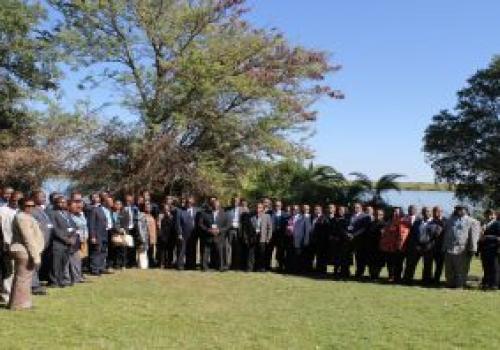The 7th SADC Digital Broadcasting Migration Forum was convened from June 10-12, 2014 in Kasane, Botswana.This is almost a year before the International Telecommunication Union (ITU) Analogue Switch Off (ASO) deadline to receive the 1st SADC Digital Terrestrial Television (DTT) Project Management Office (PMO) Bi-Annual Progress Report for 2014 on the implementation of the SADC Roadmap for Digital Broadcasting Migration.
The Report was prepared following the SADC DTT PMO assessment visits to ten (10) SADC Member States, namely; Botswana, Kingdom of Lesotho, Malawi, Mauritius, Mozambique, Namibia, Seychelles, South Africa, Swaziland and Tanzania. The Forum was preceded by the 4th SADC Digital Broadcasting Migration Implementation Steering Committee Meeting that took place on June 9, 2014. Both events were hosted by the Government of the Republic of Botswana.
A series of fora have since then been convened to oversee and review the implementation of the SADC Roadmap, namely: Mauritius in August 2009, Lesotho in April 2010, Angola in October 2011, Mozambique in August 2012, Namibia in April 2013 and Zambia in November 2013.Delivering the keynote address, the representative of the Minister responsible for Transport and Communications, the Deputy Permanent Secretary in the Ministry of State President Mogomotsi Kaboeamodimo reflected on the opportunities that are likely as a result of the transition from analogue to digital broadcasting as captured by the theme “Maximising the Digital Broadcasting Advantage”, both at an individual SADC Member State level and within the Region.
In his remarks, the representative of the Chairperson of SADC, the Deputy Principal Secretary in the Ministry of Information and Civic Education, Mr Martin Kantikana, appreciated the commitment of SADC Member States towards the work being undertaken by SADC Member States in pursuing a successful migration from analogue to digital broadcasting technologies by the ITU ASO deadline of June 17, 2015. He also highlighted that the Forum is an excellent capacity building platform for sharing of information, skills, knowledge, success and challenges in the DTT migration process. He also indicated that one of the major challenges is content production.
The Forum made the following recommendations:
- The remaining four (4) Member States will be visited by the SADC DTT PMO
- Member States that have not completed their Geneva 2006 (GE06) Frequency Coordination are encouraged to finalise their DTT Frequency Plans for the spectrum from 470 to 694 MHz and formally submit their modifications to the ITU-BR so as to benefit from both the Digital Dividend 1 (790-862 MHz) and Digital Dividend 2 (694-790 MHz).
- The Forum adopted the SADC Guidelines on Consumer Protection and Awareness on Digital Broadcasting Migration and Member States are encouraged to implement the Guidelines with immediate effect.
- SADC Member States are encouraged to provide their commitment to the SADC TV Bouquet Project by submitting to the SADC Secretariat a correspondence providing rebroadcasting rights to one of their national TV channel to all other SADC Member States.
- The SADC Secretariat will coordinate the finalization of the draft proposal on the SADC TV Bouquet. By July 14, 2014, Member States are requested to nominate one Member each to be part of the Task Team to finalise the modalities and operations of the SADC TV Bouquet for presentation to the Ministers for consideration and approval.
- SADC DTT PMO shall employ the Risk Management Tool to monitor any possible deviations that may hinder the implementation of the SADC Roadmap.
- SADC Secretariat shall continue its effort in the development of guidelines on local content development and in building capacity and awareness on e-waste framework and shall develop a long term strategy on future broadcasting technologies.
The SADC Member States are encouraged to continue working together to promote harmonisation of the Digital Dividend 1 and 2 for the benefit of the local economies and to ensure broadband reach to the underserviced communities. The Forum also received brief progress reports from the ten (10) Member States that were present regarding their status on the implementation of the SADC Roadmap, in particular progress made since the last SADC Digital Broadcasting Migration Forum. In general, the Forum noted that the Member States had made progress and had established national institutional structures, to lead the Process.
The Forum also provided opportunities for Member States to share their individual experiences on the migration and learn from Experts from the Region and beyond on various important topics on DTT broadcasting migration, such as communications strategy and consumer awareness, content development, free to air (FTA) broadcasting platforms, DTT solutions provisioning, digital dividend, SADC 700 MHz Channelling Plan Proposal and many more. The Forum approved and endorsed the SADC Guidelines Consumer Protection and Awareness on Digital Broadcasting Migration.The Forum also noted that all SADC Member States have submitted their Official Notices to the ITU-BR in respect of the GE06 Modification Coordination Exercise that ended in July 2013.
However, some SADC Member States are undertaking normal coordination work as provided for under Article 4 of the GE06 Agreement. The Forum was attended by Delegates from ten (10) SADC Member States namely; Botswana, Kingdom of Lesotho, Malawi, Mozambique, Namibia, South Africa, Kingdom of Swaziland, United Republic of Tanzania, Zambia and Zimbabwe and representatives from SADC Implementing Agencies including the Communications Regulators’ Association of Southern Africa (CRASA) and Southern Africa Broadcasting Association (SABA). Also in attendance to share their experience in the migration process were representatives from African Telecommunications Union (ATU), GSMA and Federal Communications Commission (FCC) of the Unites States of America. The 8th Digital Broadcasting Migration Forum shall be held in November 2014 in Malawi.

